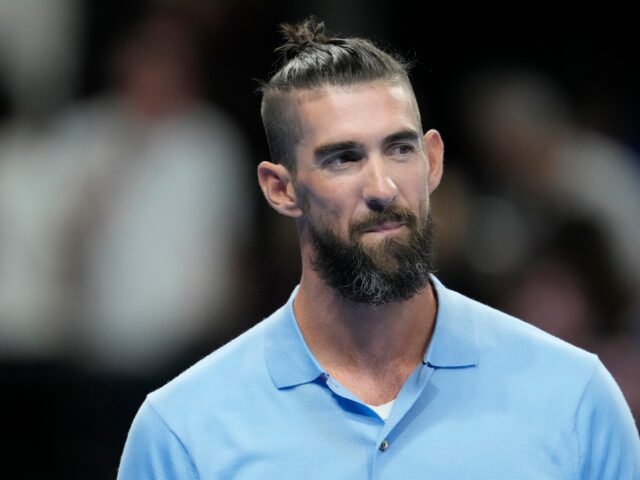History’s most decorated Olympian, swimmer Michael Phelps, told reporters competitive sports should have a “one and done” rule for athletes who test positive for banned substances – anyone testing positive should “never be allowed to come back.”
Phelps made the comments during a press availability in Paris, France, which is currently hosting the ongoing 2024 Summer Olympics. His calls for bans on doping athletes and a universal worldwide testing regimen follow multiple revelations in the New York Times throughout the year that 23 swimmers on China’s national team tested positive for the banned substance trimetazidine (TMZ), a banned drug, prior to the 2021 Tokyo Olympics and were allowed to compete after Chinese authorities blamed tainted food for the positive tests.
Chinese state media has accused those expressing concern for the integrity of the Games in light of the testing results of “racial determinism” and claimed that increased testing of Chinese athletes, which they have been subjected to because of the positive tests, was a “psychological” tactic to undermine their performance. In a particularly snarky “report” from the state broadcaster CGTN, an announcer calls those concerned about doping “sore losers” and declares, “sometimes, others are just better.”
Phelps addressed the scandal in the context of his experience as the most decorated athlete in Olympic history, having won 23 gold medals and 28 medals total in his career. He noted that many questioned if he was competing cleanly given his victories and he responded to the concerns by testing more often to prove that he was not consuming banned substances.
“If you test positive, you should never be allowed to come back and compete again, cut and dry,” Phelps told reporters. “I believe one and done.”
Phelps put much of the pressure to ensure the integrity of the Games on the organizers, not just the competitors, who he said needed to use a uniform testing regimen rather than, as the International Olympic Committee (IOC) has often done, relying on national anti-doping agencies to self-regulate.
“If everybody is not going through that same testing, I have a serious problem because it means the level of sport is not fair and it’s not even,” Phelps said. “If you’re taking that risk, then you don’t belong in here.”
In July, the New York Times published an article claiming documented evidence that two Chinese swimmers, one of whom is competing in Paris, tested positive for another banned substance but was allowed to compete after Chinese authorities advocated for them before the International Olympic Committee (IOC). The article followed reporting in April surfacing the initial revelations of the 23 swimmers who tested positive for TMZ.
The reporting in April led to Congressional hearings on international sports doping in which Phelps participated.
“Right now people are just getting away with everything. How is that possible?” Phelps told Congress in May. “It makes no sense. I’m one [who believes] if someone does test positive, I’d like to see a lifetime ban.”
The controversy has caused significant tension in the pool in Paris, leading to very public questioning of the legitimacy of the Chinese team’s victories. During the first week of competition, Chinese swimmer Pan Zhanle – who has not been named among those testing positive for TMZ or any other banned substance – broke his own world record to win gold in the men’s 100m freestyle race.
“It just doesn’t make sense for many reasons,” Australian swimming coach Brett Hawke told Sky News on August 2, casting doubt on Pan’s performance. “There’s no evidence to say that he’s [Pan] tested positive, but there’s evidence to say that drugs have to be involved here.”
Pan was on the Chinese team that won the 4×100-meter medley relay on August 4, again attracting outrage.
“In sport, one of my favorite quotes I’ve seen lately is ‘There’s no point in winning if you don’t win it fair,’” British swimmer Adam Peaty told reporters after that race, referring to the Chinese team. “I think you know that truth in your heart. Even if you touch and you know you’re cheating, you’re not winning, right? So, for me, if you’ve been on that and you have been contaminated twice, I think as an honorable person it means you should be out of the sport. We know sport is not that simple.”
“I don’t want to paint a whole nation or a whole group of people with one brush, I think it’s very unfair,” Peaty continued. “But there have been two cases of it and I think it’s very disappointing, and I’ve tried to keep out of the conversations until now for the betterment of the team but I think we’re going to use that to our advantage the next four years, whether I’m there or not. I know these boys will carry that.”
Phelps addressed the controversy surrounding Pan on Monday, refusing to impugn his victories because there is no evidence that he has tested positive for banned substances.
“Until we know the facts, we can’t point fingers. You can’t do that to somebody,” Phelps said. “I get their country has a microscope on them … but for somebody who hasn’t had that positive test, you can’t point that finger.”
Phelps nonetheless said that he understood Peaty’s frustration.
“It does break my heart to see people put hard effort into four straight years to prepare for an Olympic Games, then to have it taken away from them by somebody who is cheating,” Phelps told reporters. “It’s not right. I stand for that and I will always stand for that.”
“What has to happen is everybody has to come together and figure out one way to test everybody all over the world. Period,” Phelps concluded. “And if you test positive, you should never be allowed to come back and compete again.”

COMMENTS
Please let us know if you're having issues with commenting.